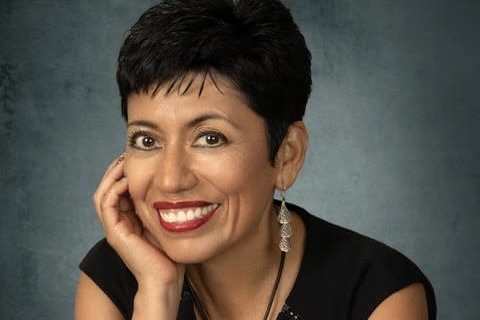After Damaris Hernández’s husband committed suicide, some of their acquaintances turned their back on her — for nearly a decade, in some cases.
(Courtesy of author)
They weren’t trying to be cruel. They were just terrified of saying the wrong things, and, therefore, they said, and did, nothing.
Hernández said such emotional impairment bubbles up from childhood, when kids are often obsessively shielded from grief and therefore don’t know how to handle themselves around it.
“My first exposure to a funeral or to someone who died was my father-in-law,” she said. “I was in my late 30s.
“My mom never wanted me to see it as a kid. You stay home and don’t talk about it,” said Hernández, 53, who was born in and spent her early childhood in Mexico but has lived in Minnesota for going on three decades.
Some people do work up the courage to try comforting the grief-stricken — but end up saying the wrong things:
“Don’t dwell on the past, move forward.”
“Just keep busy and it will go away on its own.”
“You’re only thinking about yourself.”
Hernández, well acquainted with such platitudes in the years since her husband Jim took his life in a frozen pond, became inspired to write a book about it.
“Voices of Empathy: A Guide On What To Say For Those In Grief” is aimed at those who struggle one way or another in the presence of the grief-stricken.
Damaris Hernández (courtesy of the author)
Comparing notes with fellow widows and widowers, Hernández came to wonder, “why aren’t any of us educating people?”
Hernández had another reason unrelated to the subject matter to embark on the book-length work. Her father, who has been blind since age 4, is the author of six poetry books. “I would go to him and say, ‘How did you do (that)?’
“He would say to me, ‘Just write one page a day. Just write one page a day,’” she said.
Hernández’s book includes a chapter about (and for) children: “Teaching Children About Death — A Journey For Supporters.”
She also has advice for those who don’t know what to say.
“Hold their hands,” she said. “Twenty minutes later, they’re not going to remember what you said, but they’re going to remember that you stayed. So, really, my advice is: Show up.”
Meanwhile, Hernández still struggled with the acquaintances who stopped when they saw her in the grocery store and then moved off in another direction — for nine years.
That is, until they picked up her book.
“They were like, ‘Thank you for, you know, for opening up and, I mean, just telling the story of what happened,’” Hernández said.
She had a similar experience with one of her brothers, who was abroad when her ordeal transpired, and he never delved into it — until the book.
“And he’s like, ‘Oh my gosh, like wow, now I understand what you went through for nine years.’”
Get more information about Hernández’s book at: damarisemotioncode.com/book
Related Articles
Hard pass. Cold brew. Dad bod. Merriam-Webster adds over 5,000 words to ‘Collegiate’ dictionary
Five things to know about the Julia Child exhibit at the MN History Center
‘Slow Horses’ author Mick Herron reveals the secret origins of Slough House
Literary calendar for week of Sept. 21
Readers and writers: St. Paul author took a winding road to her first thriller


Leave a Reply